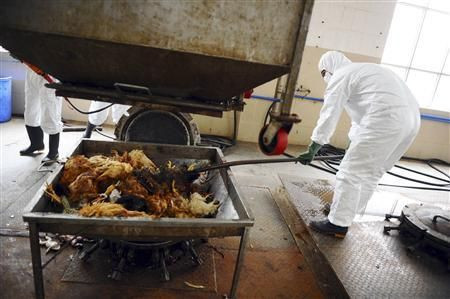Bird Flu Rising: Chinese Economy Takes Slight Hit After New Strain Spreads From Shanghai

China said on Tuesday that a new strain of H7N9 bird flu has spread to a new province: Shangdong, which is located north of Shanghai.
The virus was originally confined to Shanghai and three new provinces: Jiangsu to the north, Zhejiang to the south and Anhui to the west. There have also been reported cases in Beijing and the central Henan province. So far 105 people have been infected this year, and 21 people have died, the AFP reported.
The World Health Organization tried calmed the public, saying there was no evidence of “sustained” transmission of the virus among people. "Right now we do not see evidence of sustained human-to-human transmission," Keiji Fukuda, a top WHO influenza expert who is part of a team visiting China to study H7N9, told the AFP.
But the Wall Street Journal reported that the WHO is still rather baffled by the bird flu this year, and it in fact suggests that the lack of sustained human-to-human transmission could indicate a disease that’s even more contagious and dangerous than previous iterations of the virus.
"So far, we still have limited knowledge of the virus … but we are certain that the virus is constantly changing," said Yang Weizhong, vice-director at the Chinese Center for Disease Control and Prevention, at a news conference. Fukuda, at the same conference, noted that most of those afflicted were 60-years-old or older, but it was still unknown how the disease spread.
The WHO and Chinese officials also said they hadn’t decided whether to develop a vaccine yet.
Meanwhile, the Chinese economy has taken a hit because of the latest infections, the BBC and CNBC report. Food prices are up 30 percent, and demand for pork and chicken are sharply down after images surfaced of dead pigs floating in rivers.
"Demand for chicken in mainland China has been hit by the avian flu scare, and this will likely act as an additional dampening factor on Chinese food-price inflation in coming months," Rajiv Biswas, chief economist of Asia Pacific at IHS Global Insight, told CNBC.
“The widely reported images of dead pigs floating in rivers have also contributed to concerns among the Chinese public about pork consumption, contributing further to the decline in pork prices.”
However this will likely help curb inflation in the coming months, analysts said. Reduced demand for meat will lower short-term prices, said Jackson Wong, vice president of equity sales for Hong Kong-based trading firm Tanrich Securities, but inflation rates will probably rise again after three to six months, he predicts.
© Copyright IBTimes 2025. All rights reserved.






















